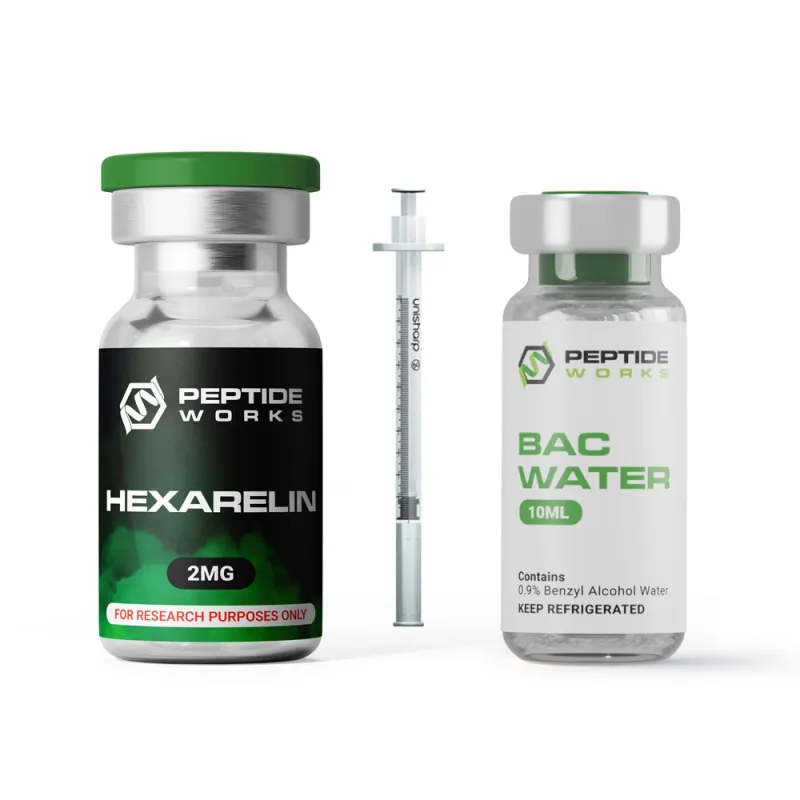
PROMO!
First order? Get 10% OFF with this code: 1storder
Written by

Hexarelin peptide is drawing attention in heart research because it acts as a synthetic growth hormone secretagogue. Early studies suggest it may affect cardiac function by interacting with the growth hormone secretagogue receptor, which plays a crucial role in regulating growth hormone secretion and related cardiovascular signals.
Scientists are examining closely how Hexarelin peptide may help support heart muscle strength, recovery, and protection against stress. This makes it a useful compound in lab studies that aim to uncover new ways to protect the cardiovascular system and improve overall cardiac output.
Other peptides, such as B7-33 and GHRP-6, are also being studied for possible beneficial effects on heart health. Together, these compounds are part of a wider effort to learn how peptide signaling may guide future cardiovascular research.
To understand this better, it’s useful to see how Hexarelin peptide may influence one of the most serious issues in heart fibrosis, its potential role in reducing cardiac fibrosis and pathological remodeling continues to attract research attention.
Explore Hexarelin Peptide from Peptide Works, a growth hormone secretagogue studied for supporting heart strength, recovery, and antifibrotic effects in research.

In laboratory studies, the Hexarelin peptide has shown potential in limiting cardiac fibrosis. This condition happens when too much collagen makes the heart muscle stiff. Hexarelin reduces inflammatory cytokines (e.g., IL-1β, TNF-α) and may modulate profibrotic signaling pathways (e.g., TGF-β) through a specific signaling cascade, in model- and stage-dependent ways. This balance supports healthier tissue remodeling in research models and shows its major role in regulating physiological processes related to fibrosis.
Animal studies also suggest Hexarelin can lower signals linked to fibrosis, such as inflammatory markers. These results point to possible antifibrotic roles under stress. Researchers are also studying its potential applications in cardiovascular research to better understand how endocrine and metabolic factors affect heart structure and repair.
Since fibrosis is directly tied to how collagen is regulated, researchers also focus on the enzyme systems that control this balance.
Discover B7-33 Peptide from Peptide Works, a relaxin-based peptide investigated for reducing cardiac fibrosis and improving ventricular compliance in studies.
In heart research, Hexarelin peptide has been linked to changes in the matrix metalloproteinase (MMP) system, which plays a key role in tissue repair. Studies suggest it may increase enzymes such as MMP-2 and MMP-9, known for breaking down excess collagen.
At the same time, Hexarelin peptide appears to reduce TIMP-1, a natural inhibitor that can block this turnover. By shifting this balance, researchers note a more favorable environment for cardiac remodeling and less rigid scar formation.
Because these enzymes regulate collagen, their activity connects directly to the broader question of how remodeling supports healthy heart function.

Collagen forms the structural framework of the heart. When balanced, it keeps the muscle strong yet flexible, allowing chambers to expand and contract with each beat. The main types in the heart type I and type III collagen are fibrillar collagens that provide tensile strength and elasticity. This collagen turnover, also called extracellular matrix remodeling, is essential for normal function.
Too much collagen, especially type I, can make the heart rigid, while type III changes affect elasticity. Both can reduce ventricular compliance and impair filling of blood. Controlled remodeling is what prevents this stiffness from leading to dysfunction.
Since remodeling directly shapes how the ventricle stretches and fills, researchers also study how collagen changes connect to ventricular compliance.
Ventricular compliance describes how easily the heart muscle stretches during filling. A compliant ventricle allows blood to enter at lower pressure, which supports smooth diastolic function and efficient pumping.
When ventricular compliance is reduced, the ventricle stiffens. Even normal blood volume can cause higher filling pressure, which limits output and may contribute to diastolic dysfunction. Researchers often connect this loss of flexibility to excess collagen buildup.
Reduced compliance is more than a structural issue it plays a central role in how dysfunction progresses. This connection makes compliance a key target for peptide-based interventions.

When the ventricle loses flexibility, blood filling becomes harder. This reduced compliance raises filling pressure, even when blood volume is normal. The extra pressure backs up, which is a hallmark of diastolic dysfunction.
A stiff ventricle also alters the end-diastolic pressure–volume relationship (EDPVR). Less blood enters during relaxation, but pressure inside the chamber increases. This mismatch can reduce efficiency and contribute to heart failure with preserved ejection fraction (HFpEF, a form of diastolic heart failure).
Alongside Hexarelin peptide, researchers have also studied B7-33, a relaxin-based peptide. Studies suggest that B7-33 may help improve ventricular compliance by reducing fibrosis and lowering filling pressures. These effects may work with ghrelin receptor activity involved in the stimulation of growth hormone and in supporting cardiovascular recovery in research models. Scientists also monitor potential side effects during ongoing peptide studies.
While structural changes explain much of the dysfunction, protecting the heart during episodes of stress or injury is another key area of research.
The heart faces major challenges during stress, such as oxidative damage or reduced blood supply. In research, cardioprotection focuses on keeping cells alive, limiting inflammation, and improving recovery after strain.
Hexarelin peptide has shown potential to reduce cell death signals and support contractile strength under stress. GHRP-6 is notable for preventing ventricular dilation and preserving systolic function in injury models. Meanwhile, B7-33 may lower fibrosis and pressure inside the ventricle, helping the heart remain more adaptable.
For this kind of research, access to reliable peptides is critical. Peptide Works, an online retailer of research peptides, provides scientists with research-grade materials to support discovery.
As these directions continue, attention is shifting toward the potential long-term role of peptide signaling in cardiovascular health.
Shop GHRP-6 Peptide from Peptide Works, a growth hormone releasing peptide researched for protecting heart function and preventing ventricular dilation under stress.
Research into Hexarelin peptide shows how it may influence fibrosis, ventricular compliance, and even heart protection under stress. Studies on related compounds like B7-33 and GHRP-6 add to this picture, pointing to new ways peptides might support heart function in the future. While these findings are early, they highlight the growing role of peptide signaling in cardiovascular research and emphasize the benefits of hexarelin observed in experimental models.
At Peptide Works, we provide research-grade peptides for laboratories worldwide. Continued exploration of peptide signaling may open new doors in preventing fibrosis, improving compliance, and advancing cardioprotective therapies.
All peptides and compounds mentioned are strictly for research purposes only and not for human use.
[1] Mao Y, Tokudome T, Kishimoto I. The cardiovascular action of hexarelin. J Geriatr Cardiol. 2014 Sep;11(3):253-8.
[2] McDonald H, Peart J, Kurniawan N, Galloway G, et al. Hexarelin treatment preserves myocardial function and reduces cardiac fibrosis in a mouse model of acute myocardial infarction. Physiol Rep. 2018 May;6(9):e13699.
[3] Locatelli V, Rossoni G, Schweiger F, Torsello A, et al. Growth hormone-independent cardioprotective effects of hexarelin in the rat. Endocrinology. 1999 Sep;140(9):4024-31.
[4] Devarakonda T, Mauro AG, Guzman G, Hovsepian S, et al. B7-33, a Functionally Selective Relaxin Receptor 1 Agonist, Attenuates Myocardial Infarction-Related Adverse Cardiac Remodeling in Mice. J Am Heart Assoc. 2020 Apr 21;9(8):e015748.
[5] Berlanga-Acosta J, Cibrian D, Valiente-Mustelier J, Suárez-Alba J, et al. Growth hormone releasing peptide-6 (GHRP-6) prevents doxorubicin-induced myocardial and extra-myocardial damages by activating prosurvival mechanisms. Front Pharmacol. 2024 May 30;15:1402138.
ALL CONTENT AND PRODUCT INFORMATION AVAILABLE ON THIS WEBSITE IS FOR EDUCATIONAL PURPOSES ONLY.
DISCLAIMER: These products are intended solely as a research chemical only. This classification allows for their use only for research development and laboratory studies. The information available on our Peptide Works website: https://peptide-works.com/ is provided for educational purposes only. These products are not for human or animal use or consumption in any manner. Handling of these products should be limited to suitably qualified professionals. They are not to be classified as a drug, food, cosmetic, or medicinal product and must not be mislabelled or used as such.
Peptide Works
Related Articles

What are the Best Cognitive Peptides?
Cognitive peptides are short chains of amino acids that researchers are exploring for their potential effects on brain function. They

Achieving increased skin pigmentation without prolonged sun exposure has been demonstrated with Melanotan peptides in research. Two commonly studied options,

Can PTD-DBM Hair Growth Peptide Stop Balding?
Hair thinning and balding affect millions worldwide, often leading to frustration and limited options. This challenge has driven researchers to